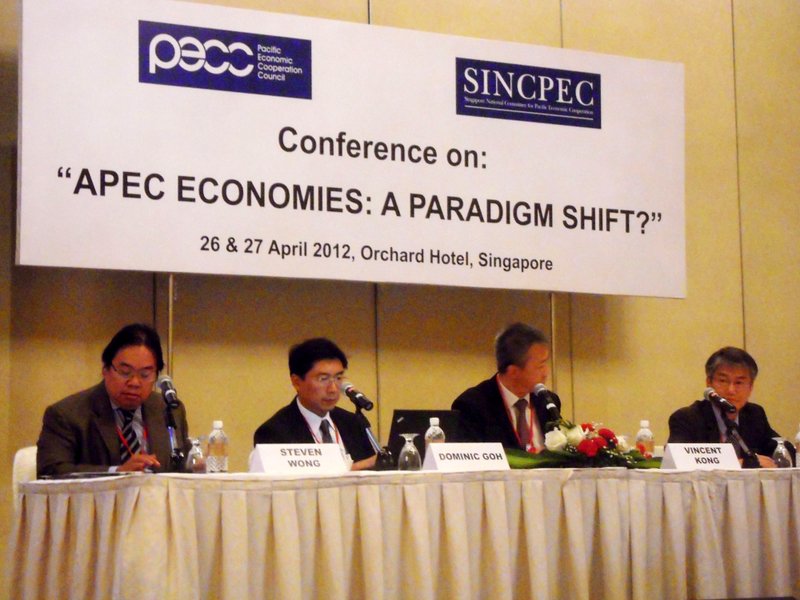 Experts of the Asia-Pacific region who gathered for the annual Singapore conference of the Pacific Economic Cooperation Council (PECC) assessed that the region would see continued sluggish growth in the next 12 months. This is largely due to the Euro zone expected to remain in recession for the time-being while domestic consumption also weakens in emerging economies. The speakers mainly representing policy think-tanks and government sectors from around the region voiced concerns with the projection of advanced economies moving beyond 100% debt versus GDP ratio by 2013. The region rebounded quickly in the aftermath of 1997-1998 financial crisis helped by strong export-led growth particularly seen in developing economies but it may not be the case this time.
Experts of the Asia-Pacific region who gathered for the annual Singapore conference of the Pacific Economic Cooperation Council (PECC) assessed that the region would see continued sluggish growth in the next 12 months. This is largely due to the Euro zone expected to remain in recession for the time-being while domestic consumption also weakens in emerging economies. The speakers mainly representing policy think-tanks and government sectors from around the region voiced concerns with the projection of advanced economies moving beyond 100% debt versus GDP ratio by 2013. The region rebounded quickly in the aftermath of 1997-1998 financial crisis helped by strong export-led growth particularly seen in developing economies but it may not be the case this time.
The speakers at the conference held on April 26-27, 2012 said that the region’s policy-makers needed to think carefully about ways to improve fiscal stability and that it required a certain paradigm shift. Professor Wang Gungwu, Chairman of the Governing Board of Lee Kuan Yew School of Public Policy and Chairman of the East Asia Institute, National University of Singapore, reiterated through his opening address that the recent financial crises that engulfed mainly “the American and European economies are the result of weak leadership and governance failure.” “Leaders would need the political will and courage to push for real change” and “this may involve a paradigm shift through which deep structural reforms are made,” he said.
Mr. Jusuf Wanandi, Co-chair of PECC and Chair of Indonesian National Committee for Pacific Economic Cooperation (INCPEC) emphasized: “There are new challenges facing the region and we must adjust to this environment. For example, Myanmar is emerging from its seclusion and we should be prepared to engage them in the broader Asia-Pacific platform.”
The agenda for regional cooperation is also changing. There is an increasing realization that the regional agenda is now taking on more complex but much needed human and social issues such as healthcare. To promote inclusive growth, healthcare is a pre-requisite not just in terms of the numbers of doctors or hospital beds but also in terms of education, sanitation and income. We also need to reconsider the ways in which incentives are given. As expressed by Professor Ranga Krishnan, Dean of Duke-NUS Graduate Medical School of Singapore, doctors get paid based on the number of patients they see and hospitals get paid for the number of patients they admit. People need to be equipped with knowledge to make informed choices and service providers should be incentivised to offer the most appropriate and quality care.
As part of its own efforts to promote trade liberalization the region is experimenting with various frameworks such as AEC (ASEAN Economic Community), ASEAN+ and the broader Asia-Pacific-centric initiatives such as TPP (Trans-Pacific Partnership), and EAFTA (East Asia Free Trade Area). The TPP has seemingly made the most progress having completed 11 negotiating rounds but the issues left are also perhaps the most difficult. Despite a wide range of different initiatives, there was a sense that these were all useful pathways towards the ultimate common goal of achieving a free trade area in the Asia-Pacific.
“The SINCPEC conference is a prelude to the APEC meetings to be held in Vladivostok, Russia in September this year,” said Associate Professor Tan Khee Giap, Chair of Singapore National Committee for Pacific Economic Cooperation (SINCPEC). “And the objective of this conference was to provide ideas and suggestions on some of the major issues that leaders of the Asia-Pacific region need to address at this critical juncture,” he added.
The Russian Ambassador to Singapore, Leonid Moiseev reiterated that Russia attaches great importance to strengthening its relevance in the Asia-Pacific region and that “Russia’s chairmanship in APEC is aimed at promoting the domestic economy integration into the system of economic ties in the Asia-Pacific for the sake of modernization and innovation-driven economic development.” He said that while there is no “magic bullet” for social reforms as seen through the experiences of other economies around the world, it was essential to launch and activate new drivers of economic growth in Russia.
The plenary sessions focused on concurrent trade liberalization efforts, ways of nurturing Asia-Pacific growth, potential structural changes, as well as functional cooperation needed in areas such as food security, energy security, and new technologies in infrastructure and connectivity with views to secure regional growth. The wide range of discussions held at the SINCPEC conference set the scene for the PECC Standing Committee meeting which immediately followed, where members deliberated on the future role of the organization and its relevance to the region.
Download program agenda (pdf, 56KB)